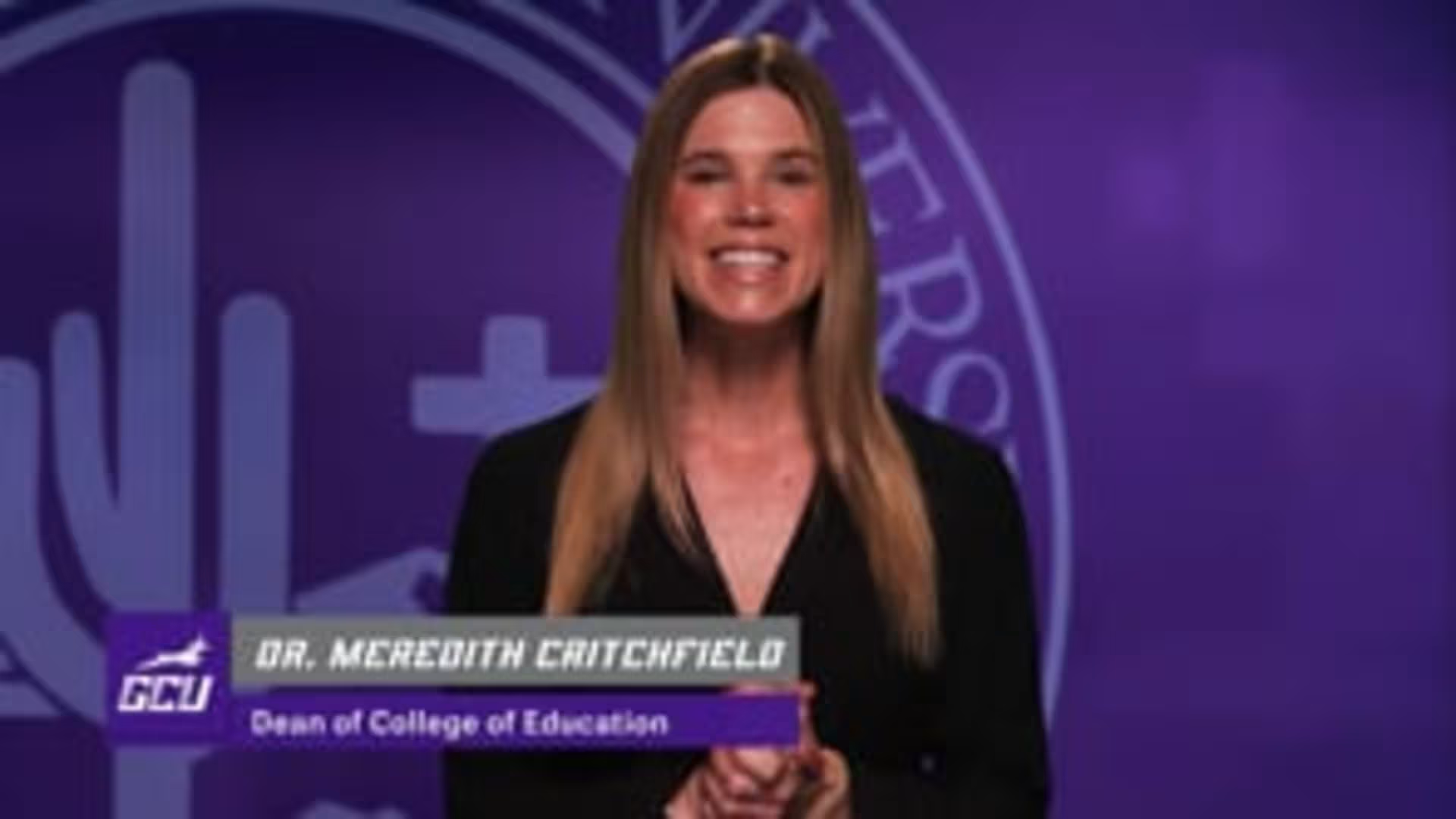
Online Master’s (MEd) in Special Education Degree
Specialized Education for K–12 Educators
GCU’s Master of Education in Special Education (Non-Initial Teaching Licensure) program is a non-licensure program designed for current, licensed educators. This MEd in Special Education non-licensure program aims to equip graduate students with specialized knowledge and practical skills that can support the development of students with exceptionalities.
Offered by the College of Education, our curriculum teaches you how to tailor instructional strategies to meet the unique needs outlined in each student’s Individualized Education Program (IEP). You can build upon existing strengths as an educator while gaining tools to support diverse learners more effectively.

Up to 12 credits or 1/3 of the total program requirements in transfer (whichever is less)
Credits: Fill out the Lopes Eval to find out what will transfer
Admission Requirements (Master's)
- Undergraduate Degree*
- 2.8+ GPA
OR 2.5+ Unweighted GPA and
- GMAT: 500
- GRE: 300 combined**
Admission requirements may differ based on degree level, program and modality, or transfer status. Some programs of study may require a higher GPA and/or other qualifying criteria for admission. Please review full admission and program requirements in the University Policy Handbook.
* Degree must be from an accredited college or program that has been approved by GCU.
** Combined verbal/quantitative, after August 2011 (1,000 combined verbal and quantitative, prior to August 2011).
Benefits of Earning This Degree From GCU
Choosing GCU for your master’s in special education can offer a range of benefits. You will have the opportunity to learn from experienced instructors, who bring personal insights and have a passion for special education. Our Christian worldview encourages compassionate teaching practices and ethical decision-making within education.
Along with career-relevant skills and a strong alumni network, this program offers:
The MEd in Special Education Program
This master’s in special education online program can help teacher candidates increase their familiarity with mild to moderate exceptionalities, while advancing knowledge in assessment and transition planning. This initial special education, mild to moderate K-12 program, does not lead to teaching licensure.

GCU’s master’s in special education online program is tailored to meet the needs of adult learners, especially those balancing work and personal commitments. The convenient online format makes it easier for you to pursue your degree.

The program is aligned to both the Interstate Teacher Assessment and Support Consortium (InTASC) standards and Council for Exceptional Children Standards. The program is institutionally accredited. Courses are led by knowledgeable instructors who are experienced in special education, mild to moderate exceptionalities for K-12 education.
Choose Between Licensure or Non-Licensure
Candidates opting for the non-licensure option are not required to fulfill the 15-week student teaching component. This option is for those seeking to advance knowledge in the area but not seeking licensing certification. This program has 36 total credits, as opposed to 44 credits with the licensure route. Candidates who take this route cannot obtain an Institutional Recommendation (IR) from GCU. Students interested in gaining initial teaching licensure may be interested in the Master of Education in Special Education (Leads to Initial Teacher Licensure) program.

Coursework in the Master’s of Education in Special Education Program
Teacher candidates who choose to earn their MEd in Special Education (Non-Licensure) degree at GCU will complete field experience assignments within several courses. These assignments guide candidates through practice-based and observational experiences. Access to a K–12 classroom is required to complete the program assignments. The classroom setting must represent mild to moderate exceptionalities and impairment categories that range from emotional, physical and health to learning and intellectual.
Study Valuable Skills for Teaching Special Education
Immerse yourself in the world of teaching special education by developing knowledge to teach and support students with exceptionalities.
In this program you will:
Discover innovative techniques
to engage students with diverse learning abilities in the least restrictive environment (LRE).
Gain insight into the educational requirements
of students with mild to moderate exceptionalities and their families, encompassing definitions, characteristics, prevalence, causes and educational strategies.
Develop an understanding of diverse assessment methods and data sources
for making diagnostic and educational choices for those with mild to moderate exceptionalities.
Foster welcome and safe learning environments
through collaborative efforts, promoting active learning, well-being and self-determination in individuals with exceptionalities.
Explore how instructional planning enhances learning
for students with exceptionalities using subject-matter knowledge and specialized curricula.
Build a foundation of understanding diverse settings
and learning experiences through individualized education and transition plans.
Gain field experience
and discover how to apply theories, research, concepts and strategies learned throughout the program.
Investigate the use of augmentative and alternative assistive technology
modifications and accommodations to enhance student communication skills.
Apply research-based strategies for teaching
focusing on math and ELA in academic and specialized curricula.
Career Paths for Master’s in Special Education (Non-Licensure) Graduates
Graduates may pursue careers in settings such as private, charter and public schools, as well as social service organizations.
These career paths may provide opportunities to contribute to the advancement of inclusive practices and improve educational opportunities for individuals with exceptionalities.
More examples of career opportunities include:
Special education teacher
Preschool and kindergarten special education teacher
Elementary school special education teacher
Middle school special education teacher
Secondary school special education teacher
Teaching assistant including special education
Earn Your MEd at an Accredited University
Since 1968, Grand Canyon University has proudly maintained institutional accreditation through the Higher Learning Commission (HLC). This longstanding recognition reflects our unwavering dedication to developing impactful educators and consistently meeting the standards set by our accrediting organizations.
Master’s in Special Education (Non-Licensure) FAQs
The decision to pursue a special education master’s program often comes with many questions. To help you make your decision, we’ve provided a few frequently asked questions about this degree.
What is the difference between an MS in Special Education and MEd in Special Education?
Is a master’s in special education worth it?
Is an MEd in Special Education (Non-Licensure) degree hard?
Program Curriculum
Core Courses

Take the next step in your career and work toward making a lasting impact in the field of special education with GCU's MEd in Special Education program. Start your journey today.
If you are seeking licensure/certification, please refer to the "Accreditation and Compliance/State Disclosures” link for the specific program of interest’s website for your location and/or employment state’s licensure requirements, per 34 CFR 668.14(b)32 and 668.43(c).
- The earnings referenced were reported by the U.S. Bureau of Labor Statistics (BLS), Special Education Teachers, as of May 2024, retrieved Aug. 14, 2025. Due to COVID-19, data from 2020 to 2023 may be atypical compared to prior years. BLS calculates the median using salaries of workers nationwide with varying levels of education and experience. It does not reflect the earnings of GCU graduates as special education teachers, nor does it reflect the earnings of workers in one city or region of the country or a typical entry-level salary. Median income is the statistical midpoint for the range of salaries in a specific occupation. It is very unlikely that a median salary will reflect an entry-level salary. It represents what you would earn if you were paid more money than half the workers in an occupation, and less than half the workers in an occupation. It may give you a basis to estimate what you might earn at some point if you enter this career. Grand Canyon University can make no guarantees on individual graduates’ salaries. Your employability will be determined by numerous factors over which GCU has no control, such as the employer the graduate chooses to apply to, the graduate’s experience level, individual characteristics, skills, etc. against a pool of candidates.


